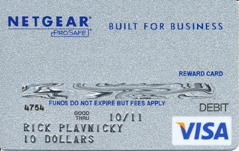I don’t get it. The trend is supposed to be toward zero. Toward cost reduction, toward savings, resource conservation, and so on and so forth.
I’m a big fan of rebates. Yeah, I’m one of those folks that actually sends ’em in and keeps track of whether or not they pay off. (They always do pay off, by the way.) By the end of the year they make for a pretty good return for the few minutes it takes to satisfy the requirements.
Yesterday’s mail brought the latest one. But instead of the usual check there was a thick envelope containing a Visa debit card.

The card was adhered to a cover letter, printed single-sided on heavy stock. The envelope also contained a Know Before You Go! insert explaining a few situations where you might expect difficulties using the card, like restaurants (where they typically pre-authorize an amount that includes gratuities) and gas stations (where the card simply won’t authorize at the pump). Finally, a tri-fold Cardholder Agreement: “IMPORTANT – PLEASE READ CAREFULLY” it implored, followed by dense, tiny print that covering both sides of the unfolded page.
Instead of the eyestrain I turned to the log. It all started when the 8+-year-old network switch in Damian‘s room finally failed. (I wasn’t unhappy; the failed switch was the last piece of stuff less than gigabit speed on the wired LAN. I wondered how many frames that old Linksys beast had switched in its lifetime…) Anyway, the Netgear replacement was on sale for about $36, then there was this $10 rebate. The rebate process consisted of a quick visit to a Web page to complete a form and print the qualification sheet (maybe 2 minutes), copy/paste the address and print the envelope, fold the qualification sheet, razorblade the bar code from the box, stuff and stamp the envelope (another 2 minutes or so to ). Then the logging and tracking on my part (another minute, tops).
The value of the whole thing? Ten bucks. All that stuff had to have cost Netgear more than that to process, produce, mail and track. Not to mention the involvement Parago, Inc., who runs Netgear’s ProSafe Rebate Center, and Visa International.
The old checks were easy to handle; just shove it into a convenient ATM and be done with it. Now there’s this card to bulge my wallet, another value to keep track of and – oh yeah – that trifold of fine print. (Where can I use it? Where can’t I? It says ‘debit’ but they said use it like credit. Hmmm.) And I’d better remember to use it before it expires. Wait a minute, expires? It’s good through October of 2011, it’s embossed right there on the plastic, but in that Fine Print…
Account Maintenance Fee: Subject to applicable law, a fee will be applied to all accounts each month, after the six month anniversary date. The charge will be recurring each month until the balance of the account is $0.00.
So, considering that the Account Maintenance Fee is $3.00, if the card sits on my desk unused then on May 2, 2011 it’ll be worth $7. On June 2, $4. August 1, $1. And finally, on July 2, $0. Hey! For three months and 29 days – from the date the fees drain it dry until the thing expires – the card will have no value at all!
So I don’t get it. Can someone explain who makes out on these things? I mean, I understand coupons. Print a lot, the redemption rate’s pretty low (Groupon fiascos excepted – small companies have been nearly put out of business!) But these? I’m sure Visa gets paid, but beyond that it baffles the mind.






All these things are deal trackers, to see how effective some come on was, and in the case of printed coupons, where to spend their advertising dollars.
I once wrote a deal tracking system for XYZ, Inc. to see which papers or flyers returned more coupons, whether center-aisle or end-aisle displays were more effective in boosting sales, etc.
Nothing is free, and they’re spending this money to see how effective some special campaign is. Incidentally, during those 6-8 weeks it takes to process your rebate, that money is on deposit in an interest-bearing account. They just might make more on your rebate than you do.